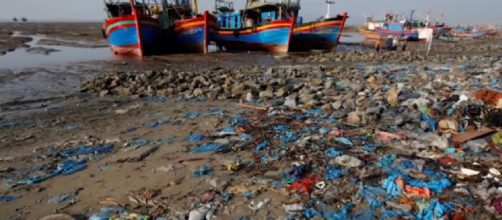Plastic is a non-biodegradable substance and remains an eyesore in the surroundings for ages. Single-use plastic materials are a legacy of the fast-paced modern times. Bottles, cups, cutlery, plates, etcetera, made of this material endanger the environment. Plastic carry bags litter the countryside and clog the drainage systems. When plastic waste ends up in the oceans, they pose serious threats to whales and other marine lives. Carcasses of whales have washed up on the beaches with tons of plastic in their stomachs. The BBC reports that a consortium including the London School of Economics carried out a study on the subject.
It reveals only 20 companies are responsible for single-use plastic items. These are described as throwaway type items discarded after use and include bottles, food packages, bags and masks. The last item is a recent addition because of the coronavirus pandemic.
A handful of companies supply the raw material required to manufacture more than half of all these items. That is the conclusion of the study team. The study examined around 1,000 factories that produce the raw materials. These companies make polymers, which are the source of all plastics. The study has identified these 20 petrochemical companies responsible for this type of waste globally.
Countries that generate most single-use plastic waste
The study also tried to locate countries that create the maximum waste related to one-time use materials. The basis of gradation was per head of population. Australia topped the list, followed by the United States, while Britain was fourth. Britain generated 40kg of this waste for every person in a year.
The BBC adds that the ongoing coronavirus pandemic has led to the addition of a new range of items to the list. These are masks and other protective and medical equipment required to fight the highly contagious disease. The focus of earlier studies was on the impact of plastic waste on different aspects of life. However, the present study attempted to go to the root of the issue, namely the basic ingredients and the supply chain.
In May 2018, the European Union said it would ban single-use plastic from saving the environment.
Few companies responsible for the plastic waste crisis
Australia's Minderoo Foundation led the research. There was also a consortium consisting of market researchers and an environment institute. Polymers are the main ingredients for plastic that come from the processing of fossil fuels like oil, gas, and coal. The study points out that instead of relying on fossil fuels, the world should opt for recycled plastic to produce single-use products. The BBC says the report highlights that plastic production could increase by 30 percent in the next five years. That would have a cascading effect on carbon emissions and an increase in plastic waste.
In the opinion of a specialist in climate change economics: "Our reliance on oil and gas is not only fuelling climate change but as the primary material used in the production of throwaway plastics also devastating our oceans." ExxonMobil is the largest producer of plastic polymers in the world. It says it shares the concerns of society on this nature of waste and is taking action to address the issue. In October last year, England banned single-use plastic like straws, stirrers and cotton buds.
Fossil fuels are the base material for plastic
According to CNN, single-use plastics include a wide variety of items made from polymers. These use fossil fuels as a base material. A study reveals that the production of this type of plastic would grow over the next five years.
The result would be global warming and ocean pollution. It seems, in 2019, the world witnessed a generation of millions of metric tons of single-use plastic. Some of them were burned, another portion buried in landfills, while the balance ended up in the land or the ocean.


